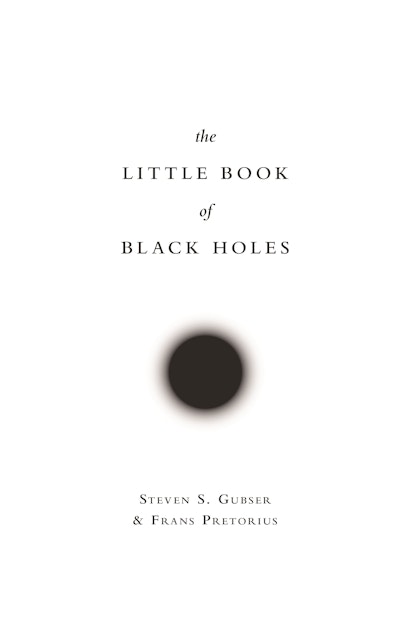Black holes, predicted by Albert Einstein’s general theory of relativity more than a century ago, have long intrigued scientists and the public with their bizarre and fantastical properties. Although Einstein understood that black holes were mathematical solutions to his equations, he never accepted their physical reality—a viewpoint many shared. This all changed in the 1960s and 1970s, when a deeper conceptual understanding of black holes developed just as new observations revealed the existence of quasars and X-ray binary star systems, whose mysterious properties could be explained by the presence of black holes. Black holes have since been the subject of intense research—and the physics governing how they behave and affect their surroundings is stranger and more mind-bending than any fiction.
After introducing the basics of the special and general theories of relativity, this book describes black holes both as astrophysical objects and theoretical “laboratories” in which physicists can test their understanding of gravitational, quantum, and thermal physics. From Schwarzschild black holes to rotating and colliding black holes, and from gravitational radiation to Hawking radiation and information loss, Steven Gubser and Frans Pretorius use creative thought experiments and analogies to explain their subject accessibly. They also describe the decades-long quest to observe the universe in gravitational waves, which recently resulted in the LIGO observatories’ detection of the distinctive gravitational wave “chirp” of two colliding black holes—the first direct observation of black holes’ existence.
The Little Book of Black Holes takes readers deep into the mysterious heart of the subject, offering rare clarity of insight into the physics that makes black holes simple yet destructive manifestations of geometric destiny.
Awards and Recognition
- Steven S. Gubser, Winner of the 2017 Simons Investigator Award in Physics, Simons Foundation
- Frans Pretorius, Winner of the 2017 New Horizons Prize in Fundamental Physics
"Gubser and Pretorius offer clarity on a difficult topic, with a healthy dose of wonder to boot."—Publishers Weekly
"The thrills come thick and fast, not least when a hypothetical probe nearing a singularity is 'squished and stretched into an infinitesimally thin line'."—Barb Kiser, Nature
"Princeton physics professors Gubser and Pretorius condense their significant expertise in black holes into an easily digestible analysis. . . . The authors excel at describing these complex scientific ideas within relatable contexts, and they provide readers with detailed explanations of general and special relativity before discussing the cutting-edge experiments and theories that make black holes more intriguing than ever. . . . Don't be fooled by its ‘little' title; these renowned physicists deliver a robust and thrilling book that will draw readers in as surely as any event horizon."—Kirkus Reviews
"The Little Book of Black Holes will more than satisfy anyone who has heard about them and wants to know more."—Skymania News
"It's clear that [this book] really will take the knowledge of anyone with a serious interest in black holes up to the next level. . . . I wholeheartedly recommend this book for a popular science reader who wants to get more depth on the nature of black holes and how general relativity made it possible to conjure them up."—Brian Clegg, Popular Science
"The book is beautifully, if densely, written, with the authors sending Alice and Bob on many adventures through space-time and tossing them willy-nilly into black holes. Reading it requires significant effort, but is rewarding for its sense of just how utterly bonkers the universe is, and how significant gaps in our knowledge remain."—Cait MacPhee, Times Higher Education
"Excellent. . . . This lovely book is a rollercoaster ride through time and space, taking the reader right through the ins and outs of peculiar objects like black holes, white holes, and even wormholes, with bouts of ‘real -life' illustrations to keep the experience (somewhat) grounded. All of this and much more in less than 200 pages, which speaks volumes about the authors’ ability to condense an eminently complex subject into a relatable form. Prepare for a lot of weirdness but if you can make it to the end, you might feel a little shiver after grazing the last chapter."—ZME Science
"[A] concise introduction to one of the Universe's strangest phenomena. . . . It is probably just about right for a person who wants to acquire a rudimentary understanding of black holes, while also being a good introduction and stimulant for someone who might decide to explore further."—Anthony Toole, Waterstones
"The Little Book of Black Holes by Gubser and Pretorius provides an elegantly brief introduction to the basic properties of black holes and their occurrence in the universe. I warmly recommend it to the general reader."—Roger Penrose, author of Fashion, Faith, and Fantasy in the New Physics of the Universe
"This timely book provides an excellent summary of what we know about black holes in the universe. Gubser and Pretorius are among the world's most prominent experts on this exciting subject."—Raphael Bousso, University of California, Berkeley
"Entertaining as well as informative. The Little Book of Black Holes is well written, well organized, and enjoyable to read."—Gary Horowitz, University of California, Santa Barbara
"This is a really excellent, beautifully written book. I am not aware of any other book that even approaches a comparably succinct exposition of the physics of black holes."—Sean Hartnoll, Stanford University

